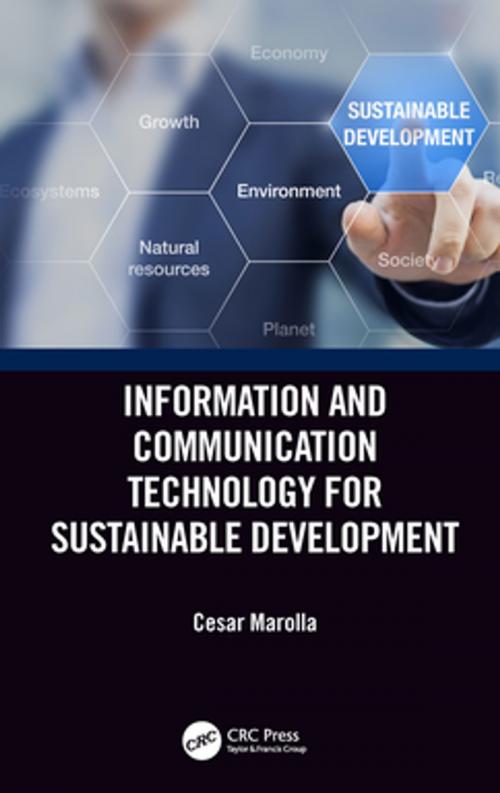Information and Communication Technology for Sustainable Development
Nonfiction, Reference & Language, Law, Environmental, Computers, Advanced Computing, Engineering, Computer Engineering, Science & Nature, Nature, Environment, Environmental Conservation & Protection| Author: | Cesar Marolla | ISBN: | 9781351045216 |
| Publisher: | CRC Press | Publication: | November 13, 2018 |
| Imprint: | CRC Press | Language: | English |
| Author: | Cesar Marolla |
| ISBN: | 9781351045216 |
| Publisher: | CRC Press |
| Publication: | November 13, 2018 |
| Imprint: | CRC Press |
| Language: | English |
Information and Communication Technology for Sustainable Development shows how ICT, as an enabler for all spheres of development, can help innovate business processes and operations, and provide faster integration of new technologies into business systems. Focused on sustainability, the book addresses strategic approaches to cope with a range of climatic, environmental, cyber-security threats and other global risks, and aims to promote prosperity and economic growth. Furthermore, it explores how the adoption of new technologies, and collective action based upon a strategic behavioral theory of new leadership, can be applied when responding to specific set of conditions that allow for the proposed strategies to cope with risks.
Information technology and strategic planning complement each other to attain the sustainable development goals (SDGs). Risk management frameworks, business continuity systems, and strategic planning methodologies such as mechanism design theory, strategic adaptive cognition (SAC), and risk mechanism theory (RMT) are the fundamental components needed to have a universal approach embedded into the national development plans agenda. As technology no longer follows an orderly, linear path, but improves exponentially, developing a strategic approach to ICT implementation help world leaders in the difficult but inspiring task of making a sustainable world and consequently find solutions to achieve the SDGs and the desired growth pattern that must be sustained, inclusive and equitable.
Features:
- Discusses for the first time the potential of ICT as a transformative power in finding solutions to climatic and economic issues.
- Illustrates comprehensive strategic planning for leaders to implement in both public and private organizations.
- Integrates standards and frameworks in the context of sustainable development along with the UN Sustainable Development Goals.
- Describes in detail how mechanism design, risk management, business continuity systems, a comprehensive strategic planning using SAC (Strategic Adaptive Cognition) and risk mechanism theory can be used to address environmental risks and attain sustainable development goals (SDGs).
- Explains eHealth as an adaptation strategy to address future changes in climate and impacts, and the links between mitigation and adaptation to ICTs.
Information and Communication Technology for Sustainable Development shows how ICT, as an enabler for all spheres of development, can help innovate business processes and operations, and provide faster integration of new technologies into business systems. Focused on sustainability, the book addresses strategic approaches to cope with a range of climatic, environmental, cyber-security threats and other global risks, and aims to promote prosperity and economic growth. Furthermore, it explores how the adoption of new technologies, and collective action based upon a strategic behavioral theory of new leadership, can be applied when responding to specific set of conditions that allow for the proposed strategies to cope with risks.
Information technology and strategic planning complement each other to attain the sustainable development goals (SDGs). Risk management frameworks, business continuity systems, and strategic planning methodologies such as mechanism design theory, strategic adaptive cognition (SAC), and risk mechanism theory (RMT) are the fundamental components needed to have a universal approach embedded into the national development plans agenda. As technology no longer follows an orderly, linear path, but improves exponentially, developing a strategic approach to ICT implementation help world leaders in the difficult but inspiring task of making a sustainable world and consequently find solutions to achieve the SDGs and the desired growth pattern that must be sustained, inclusive and equitable.
Features:
- Discusses for the first time the potential of ICT as a transformative power in finding solutions to climatic and economic issues.
- Illustrates comprehensive strategic planning for leaders to implement in both public and private organizations.
- Integrates standards and frameworks in the context of sustainable development along with the UN Sustainable Development Goals.
- Describes in detail how mechanism design, risk management, business continuity systems, a comprehensive strategic planning using SAC (Strategic Adaptive Cognition) and risk mechanism theory can be used to address environmental risks and attain sustainable development goals (SDGs).
- Explains eHealth as an adaptation strategy to address future changes in climate and impacts, and the links between mitigation and adaptation to ICTs.















